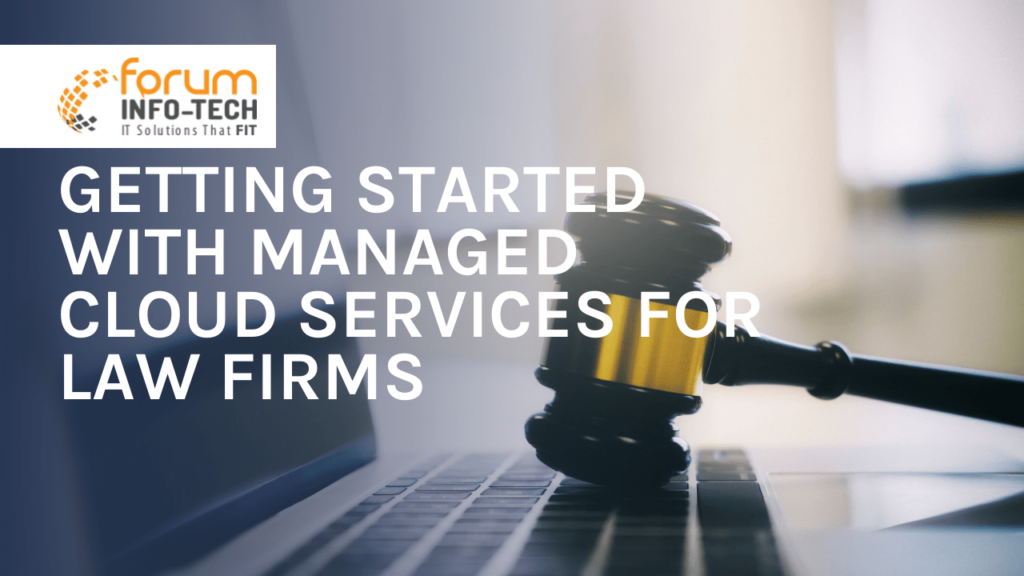In the modern-day and age of technological advancement, manual storage and unencrypted systems have become outdated and unsafe. Confidential information can easily be acquired, mutated, and lost.
Cloud computing allows law firms to streamline their information technology operations by transferring ownership of equipment and software and the related support and maintenance duties to the cloud provider.
With the flexibility to increase capacity on demand, costs are lowered, and capital expenses are converted to operational expenses.
However, there are hazards associated with such a substantial change in how you manage your infrastructure. It is critical to have a solid strategy for making the change to reap the rewards.
What Are Cloud Computing Services?
The availability of on-demand internet services such as apps, data storage, processing power, and so on is referred to as cloud computing. It lets users access software and internet services from any location without physical infrastructure.
Businesses of all sizes are often users of cloud service providers who can supply essential services like storage or software for better practice management.
These companies may then use cloud computing services to successfully manage their operations such as contract management, litigation, intellectual property, and so on and adapt to their customers’ demands.
Getting Started
Across the country, law firms are shifting away from on-premise file servers and toward cloud-based storage and document management solutions.
Before the current epidemic, legal firms were looking to the cloud as a viable solution to the expenses, difficulties, and inflexibility of on-premise file servers.
Today’s legal firm requires:
- Measures to improve data security and compliance
- Access to client, matter, and firm records (all of them) from any location
- Simplicity and ease-of-use to boost adoption throughout the organization
- Document access without the hassle of cumbersome VPN connections
As a result, many legal companies are looking for the finest cloud storage for law businesses. And there is no lack of cloud-based storage and file systems fighting for your money these days.
The most competitive law firms are those that use cloud computing. Last year, 88 percent of enterprises had used cloud computing.
In other words, cloud computing is rapidly becoming commonplace, and legal firms that fail to capitalize on its potential risk falling behind.
Consider whatever technologies you require, select a few viable providers, and ask the proper questions to ensure data security and GDPR compliance. Your customers—and your company—will appreciate it.
Before You Begin
Here are some factors that you should consider before switching to a complete cloud-based system.
Examine Your Apps To See Which Ones Are Suitable For The Cloud
Take the time to generate an inventory of all your applications if you don’t already have one. Once this list is complete, start evaluating cloud readiness and suitability apps.
Some apps will have security issues or particular architectural constraints that may make them unsuitable for cloud deployment.
Others may have anticipated growth or be on hardware that is about to be retired, in which case migrating to the cloud might provide immediate benefits.

Make A Migration Plan
Take a step back after you’ve found an application to migrate to the cloud before delving into the technical intricacies of executing the migration.
Ensure that you understand the business case for transferring that application and have realistic expectations of the benefits of moving it to the cloud.
Consider how it will affect business users, operations staff, and disaster recovery strategy. Make sure you understand how you’ll monitor the application and assess the advantages of the move.
Recognize What Using The Cloud Means
Three types of clouds are available. The cloud relocates your data center to the facilities of the cloud vendor.
A private cloud develops an on-demand, virtualized infrastructure on your premises. With hybrid cloud, part of your processing takes place in your private cloud and some in the public cloud, maybe to accommodate peak demand periods.
The cloud is also strongly linked to the “as a Service” delivery paradigm. There are three basic types of “as a Service”.
IaaS (Infrastructure as a Service) only provides computation, storage, and networking capabilities on demand. Platform as a Service (PaaS) offers capabilities for creating cloud-based applications. Software as a Service (SaaS) is a subscription-based model for delivering programs.
Choose An Application To Try Out The Cloud With
Choose an application that is large enough to illustrate the benefits of the cloud but not so vital that it would jeopardize your business if you have problems.
You could choose to start with non-production settings, such as development and testing. Moving standard packaged programs is another excellent place to start.
Transfer The Software To The Cloud
Carry out the application’s cloud migration. Allow adequate time to assess the impact on performance, cost, and end-users following the move.
You’re ready to move to the next application once you’ve handled any concerns and your support team is comfortable managing cloud-based apps.
What Law Firms Need From The Cloud
Cloud computing has several advantages, but not all cloud-based businesses are created equal. If your legal practice is considering a cloud migration, here are a few crucial characteristics to look for in a reputable cloud provider:
High-Quality Security
It is your responsibility to keep your clients’ data safe. Make certain that any vendor you work with meets the highest security requirements for your practice, including encryption.
To keep client and firm information private, inquire with your provider regarding data encryption.
Third-party verification is available. Ensure that third-party organizations have validated your vendor’s security.
Redundancy in geography. Inquire with your cloud provider about different server locations—this is essential for ensuring that your company’s data is constantly backed up.
Excellent Assistance
Some cloud-based software companies offer excellent customer service. Before you join up, inquire about the hours of support, if you’ll have to pay for it.
Whether you’ll have other alternatives for asking inquiries, such as email or chat, and what the usual wait time is for a support call.
Mobile Connectivity
One significant advantage of cloud-based software is that it may be accessed from any location and on any device.
Most cloud-based software providers that would interest attorneys offer user-friendly mobile applications that complement their online apps.
Make careful to test them out before deciding on a vendor since you’re likely to be on your phone more than you realize.

What Cloud Services Do Law Firms Need?

The legal technology sector is expanding, with new cloud-based specialty solutions for various activities and practice areas being released regularly.
Here are a few cloud-based tools and services that legal firms are using:
Software For Case Management
To begin with, any tech-savvy legal practice employs cloud-based case management software to centralize all firm information.
Cloud-based case management software like ProLaw is the key to a contemporary, efficient, and successful law business, with easy interfaces, integrations with other products you currently use, and the flexibility to practice from anywhere.
Software For Storing Documents
You’ll never have to worry about running out of space for your data again with cloud-based solutions like Box, Dropbox, and NetDocuments.
Keep your papers safe in the cloud and access them whenever you need them, whether during a client meeting or while conducting research.
Software For Accounting
Accounting for your legal practice may also be done in the cloud. Klyant, for example, makes it simple to keep track of client and office money and provides comprehensive reporting options to provide you with useful insights into your firm’s finances.
There’s practically nothing that cloud-based software can’t help your law practice with, from client onboarding to IP docketing to business reporting and analytics.
Take the time to look into your options—you could come across an app or service that saves you hours of labor.
Advantages Of The Cloud For Law Firms

The cloud offers undeniable advantages for law firms that may still be skeptical about making the switch. Here are a few examples:
- Increased security. Cloud computing suppliers can spend on security infrastructure orders of magnitude more secure than what a small-to-medium-sized law firm can invest in to protect on-premise computers due to economies of scale.
- The cost-effectiveness. Cloud-based solutions can save IT expenses by eliminating frequent software upgrades and the need to maintain an on-premise server.
- Mobility. Are you stuck in line at the dentist’s office? Are you on the train? Are you waiting for your child to come home from school? You may use the cloud to evaluate a document, authorize a bill, and much more—all from the palm of your hand.
- Updates are performed automatically. There will be no more waiting for software updates: You’ll always have the most up-to-date software using the cloud.
- Operational efficiency. Many cloud-based apps integrate, allowing you to build your technological ecosystem while preserving all of your company’s data in one place.
- Better customer service. Millennial consumers desire on-demand service, and with them expected to constitute up to half of the workforce by 2020, their wants should be taken into account.
Your legal company may use the cloud to deliver the rapid updates, and smooth service millennials expect, keeping your business competitive and lucrative.
The Bottom Line
Cloud computing is a must-have tool for law companies today. This article addressed all facets of fundamental cloud computing, including the present state of law businesses and cloud-based solutions.
There was also a full discussion of the benefits of this strategy for attorneys. Lawyers may stay on top of their game by utilizing these services for legal practice management and contract management to meet the demands of their clients.

